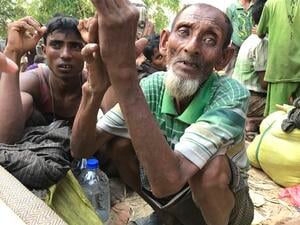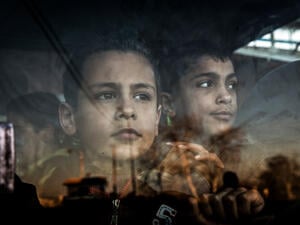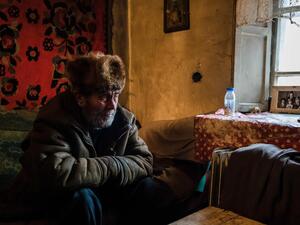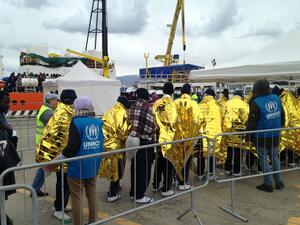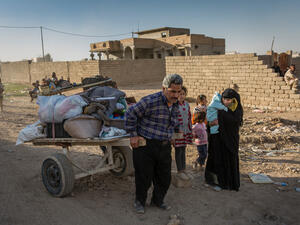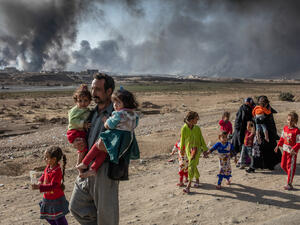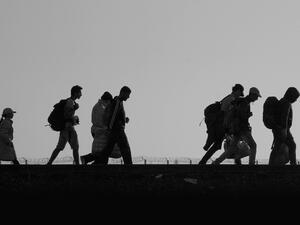New UNHCR global refugee/displaced statistics report released today
New UNHCR global refugee/displaced statistics report released today
Today, we're releasing our annual global count of uprooted people of concern to UNHCR around the world. While the number of refugees worldwide has reached a 26-year low, the total of concern to UNHCR actually rose last year to nearly 21 million, primarily because of our expanding role in caring for the world's internally displaced.
The "2005 Global Refugee Trends" report says that despite a drop in refugee totals from 9.5 million in 2004 to 8.4 million last year, the overall number of concern to us has increased by 1.3 million - from 19.5 million to 20.8 million. Much of the increase is due to a rise in the number of people living in refugee-like situations within their own countries. UNHCR now counts 6.6 million conflict-generated internally displaced people in 16 countries as being "of concern," compared to 5.4 million in 13 countries at the end of 2004.
A press release which you've received quotes High Commissioner António Guterres as saying that as we approach World Refugee Day on June 20, the good news is that global refugee numbers are the lowest since 1980; that last year saw the smallest mass outflows of new refugees fleeing into neighbouring states since 1976; and that more than 6 million refugees have been able to go home since 2002. The bad news is that the international community still has a long way to go in resolving the plight of millions of internally displaced people in places like Darfur, Uganda and the Democratic Republic of the Congo. The world's internally displaced - sometimes called "internal refugees" - need a lot more help than they're now getting and UNHCR is very much involved in that effort.
UNHCR has actually been helping specific populations of internally displaced people (IDPs) for three decades, but it is now being asked to take an increasingly active role with the world's estimated 20-25 million IDPs - who are not covered by the 1951 Refugee Convention because they have not left their countries. Last year, the United Nations strengthened its collaborative effort to address the needs of more internally displaced people by assigning specific sectoral functions to various UN agencies, and UNHCR was given responsibility to lead the protection, camp management and emergency shelter clusters.
The 6.6 million internally displaced people for whom UNHCR already works represent 32 percent of the total population of concern (20.8 million) to us, second only to refugees at 40 percent. The remaining 28 percent in the agency's 2005 count includes returned refugees and returned displaced (1.6 million); asylum seekers (773,000); stateless people (2.4 million); and "various" such as those unable to apply for asylum despite being in need of protection (960,000). UNHCR's figures do not include 4.3 million Palestinian refugees who fall under the responsibility of the UN Relief and Works Agency (UNRWA).
The vast majority of the world's uprooted people remain in developing nations. The 2005 statistics show five nationalities accounting for nearly half of the total population of concern to UNHCR: Afghans (2.9 million); Colombians (2.5 million); Iraqis (1.8 million); Sudanese (1.6 million); and Somalis (839,000). With more than 2 million internally displaced, Colombia hosted the largest population of uprooted people of concern to UNHCR, followed by Iraq (1.6 million), Pakistan (1.1 million), Sudan (1 million) and Afghanistan (912,000).
It was the fifth straight year in which the global population of refugees - those who have crossed an international border - declined. Global refugee numbers have fallen by 31 percent since 2001, from 12.1 million to 8.4 million at the end of 2005. All five regions covered by UNHCR reported a decrease in the refugee population in 2005.
Of the 1.1 million refugees who went home last year, 752,000 went to Afghanistan, 70,000 to Liberia, 68,000 to Burundi, 56,000 to Iraq and 54,000 to Angola. In all, there were 15 UNHCR repatriation operations involving at least 1,000 refugees last year.
Mass movements of new refugees into neighbouring countries - so-called prima facie refugees - amounted to their lowest total since 1976.


